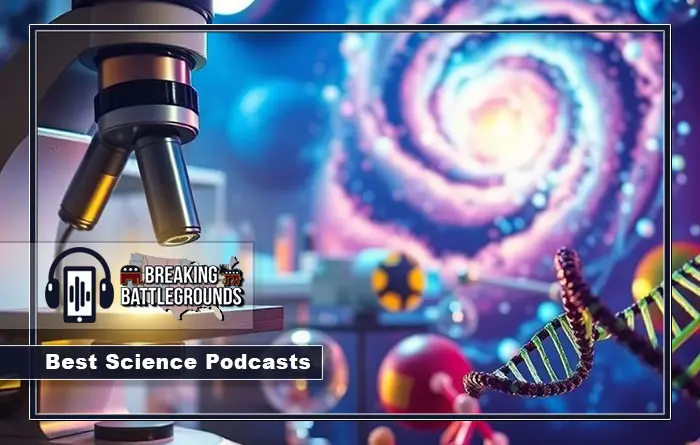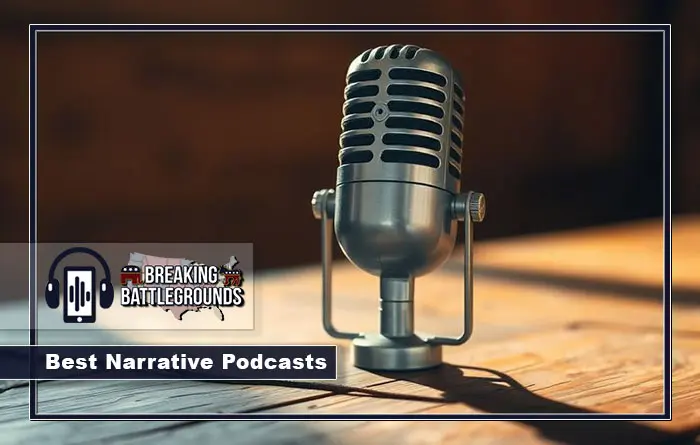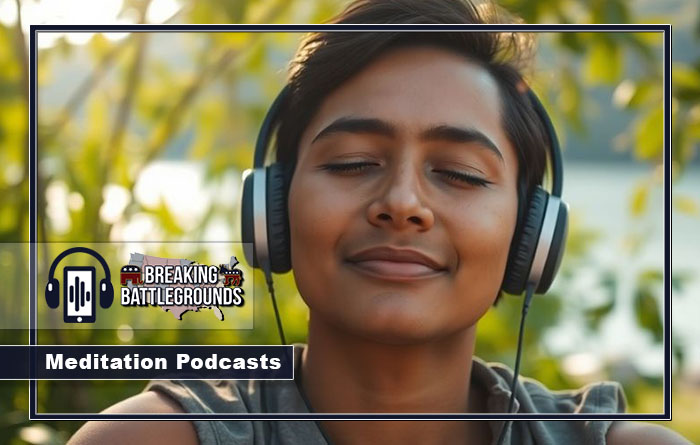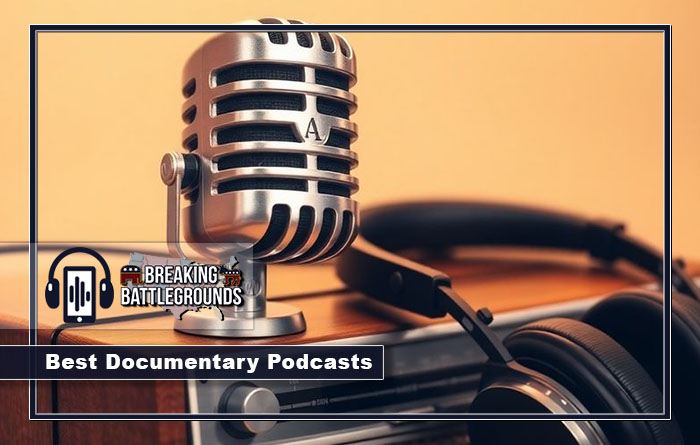So, you’re looking for some awesome science podcasts to listen to? Good call! There are tons of them out there, which is great, but it can also make it tough to pick. Don’t worry, I’ve got you covered. I’ve put together a list of the 17 Best Science Podcasts you absolutely need to check out in 2025. Whether you’re into space, the human brain, or just how everyday stuff works, there’s something here for everyone. Get ready to learn some cool new things!
Key Takeaways
Podcasts are a great way to learn about science.
This list highlights 17 top science podcasts for 2025.
There’s a wide range of science topics covered.
You can find shows about space, the brain, and more.
These podcasts make learning fun and easy.
1. Radiolab

Radiolab has been around since the early 2000s and is often called the grandfather of science podcasts. The show isn’t afraid to try new things with how it tells stories and sounds, making it a standard for other podcasts. Radiolab does a good job of balancing science with real-life stories. It’s a podcast that tells stories but is also full of information.
With the energy of the hosts, Lulu Miller and Latif Nasser, this balance is key to why the show has lasted so long. It’s great for people who are curious. Radiolab looks at science, legal history, and ethics in episodes that can be short, like twenty minutes, or long, like an hour of detailed analysis. When a show has a lot of fans, changes can be hard. Even though two hosts left in the last few years, the show is still great. If you are interested in revisiting Jaws’ impact, this podcast is for you.
Radiolab strikes a balance between being scientifically rigorous and empathetic. It explores science, legal history, and ethics in episodes that vary from quick twenty-minute bites to an hour of in-depth analysis.

Listen Now
2. Ologies
Ologies with Alie Ward is a podcast that’s all about diving deep into different fields of study. Each week, Alie chats with a different expert, exploring everything from the science of bugs to the study of clouds. It’s a really cool way to learn about something new, and Alie’s enthusiasm is contagious. She’s great at asking the questions you’re actually thinking, making even complex topics easy to understand. Plus, they have “Smologies,” which are shorter episodes perfect for younger listeners or anyone who wants a quick dose of science. It’s insightful and forward-thinking, and Alie’s approach makes it super engaging. I think the best part is how she highlights the passion these experts have for their work; it’s really inspiring. You can learn about engaging content on their website.
I really appreciate how Ologies makes science accessible to everyone. It’s not just for scientists or academics; it’s for anyone who’s curious about the world around them. Alie’s interviews are always informative, entertaining, and thought-provoking. It’s one of those podcasts that leaves you feeling smarter after every episode.
Here are some reasons why Ologies is a must-listen:
It covers a wide range of topics.
Alie Ward is an excellent host.
It’s educational and entertaining.
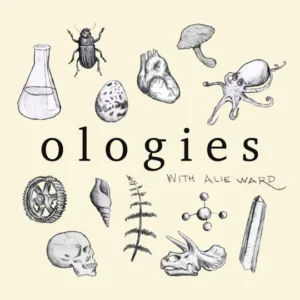
Listen Now
3. Science Friday
Science Friday, produced by Science Friday and WNYC Studios, remains a cornerstone among top science podcasts in 2025. Hosted by Ira Flatow, this science podcast delivers an engaging mix of interviews and discussions on current science topics. It’s designed to make complex subjects accessible and interesting for a broad audience.
Science Friday covers a wide range of topics, from the latest breakthroughs in technology to environmental issues and space exploration. The show often features experts in their fields, providing listeners with informed perspectives on important scientific developments. If you are looking for great science podcasts, this is a must-listen.
Science Friday is known for its commitment to unbiased science podcast reporting and its ability to present information in a clear and understandable way. It’s a reliable source for staying informed about the world of science.
Here’s why Science Friday continues to be a favorite:
Diverse Topics: From biology to physics, the show covers a wide array of scientific disciplines.
Expert Guests: Interviews with leading scientists and researchers provide in-depth insights.
Engaging Format: The show balances informative content with an accessible and entertaining style.
While it doesn’t delve into science fiction podcast territory, it remains a solid choice for those seeking science podcasts for adults.

Listen Now
4. StarTalk
StarTalk is where science meets pop culture, and it’s hosted by none other than astrophysicist Neil deGrasse Tyson. He, along with his co-hosts, tackles everything from astronomy to the physics of everyday life. It’s a fun way to learn, but some find the format a bit clunky.
The show aims to make science accessible, but sometimes it feels like it’s trying too hard to be funny, which can detract from the actual science. It’s a balancing act, and it doesn’t always nail it.
Here’s what you can expect:
Discussions on space exploration
Explanations of complex scientific concepts
Interviews with celebrities and experts
StarTalk is available on various platforms, including Apple Podcasts, Spotify, and YouTube. Episodes average around 52 minutes, making it a good option for your commute. If you’re looking for a podcast that blends science with a bit of humor, this might be up your alley. It’s like a cosmic joyride for stargazers and science buffs alike. You might even find yourself pondering alien neighbors or the science behind Star Wars.
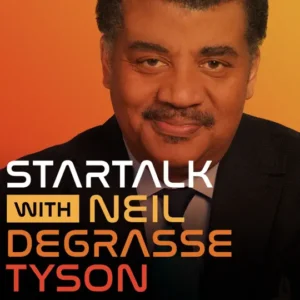
Listen Now
5. Hidden Brain
“Hidden Brain” explores the unconscious patterns that drive human behavior, shape our choices, and direct our relationships. Hosted by Shankar Vedantam, this podcast uses science and storytelling to reveal the hidden side of everything. It’s a great way to understand not just why we do what we do, but also how we can make better decisions.
“Hidden Brain” is a highly recommended podcast for those interested in engaging discussions that delve into the complexities of human behavior.
It’s not just about abstract concepts; the podcast connects these ideas to everyday life. Episodes often feature real-life stories and interviews, making the science accessible and relatable. If you’ve ever wondered why you feel stuck or how to improve your relationships, this podcast offers some answers.
Here’s what makes it stand out:
Focus on practical application: The podcast doesn’t just present research; it shows you how to use it.
Engaging storytelling: Vedantam is a skilled storyteller, making complex topics easy to understand.
Diverse topics: From creativity to relationships, the podcast covers a wide range of subjects.

Listen Now
6. Science Vs
Science Vs is a podcast that really digs into the science behind trending topics and debates. Hosted by Wendy Zukerman, it’s produced by Spotify Studios. The show tackles everything from health fads to environmental issues, using research to separate fact from fiction. It’s like having a friend who’s also a scientist explain things to you, which is pretty cool.
The podcast’s main goal is to debunk myths and misconceptions using scientific evidence. It’s not about just stating opinions; it’s about backing things up with data. This approach makes it a reliable source for understanding complex issues.
Here’s what makes Science Vs stand out:
Evidence-based analysis
Engaging presentation
Wide range of topics
I think one of the best things about Science Vs is how it makes science accessible. It’s not dry or boring; it’s actually pretty entertaining. If you’re curious about the world and want to learn about science without getting overwhelmed, this podcast is definitely worth checking out.
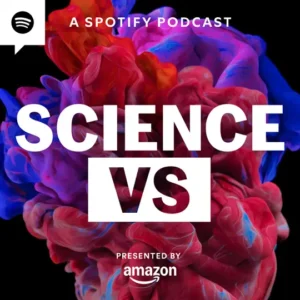
Listen Now
7. The Infinite Monkey Cage

The Infinite Monkey Cage is a BBC science show that’s been around since 2009. It’s a mix of science and comedy, hosted by physicist Brian Cox and comedian Robin Ince. They bring on scientists and comedians to talk about different topics. It’s impressive how the format hasn’t gotten old after so many seasons. You can find it on YouTube, Spotify, and other platforms.
The show’s success is because of its hosts. Brian Cox was in rock bands before getting his PhD. Each week, the hosts are joined by a panel peppered with scientists and comedians to discuss a new topic, such as hunting for exoplanets or space archaeology.
Here’s what makes it great:
Enthusiastic Hosts: Cox and Ince keep things interesting.
Mix of Guests: Scientists and comedians bring different perspectives.
Wide Range of Topics: They cover everything from space to the human body.
It’s a fun way to learn about science without feeling like you’re in school. The average length is about 40 minutes, perfect for a commute or a quick break. With a large following on Facebook and other social media, it’s clear that this podcast has a dedicated audience. If you like science with a side of humor, this is for you. It’s a great way to get your weekly dose of intellectual fun.

Listen Now
8. Stuff To Blow Your Mind
Ever find yourself pondering the really weird questions about the universe? Then “Stuff To Blow Your Mind” might be your new favorite podcast. It’s hosted by a couple of curious minds who aren’t afraid to tackle subjects that range from the far reaches of space to the inner workings of the human brain.
This podcast explores the intersection of science, philosophy, and the downright bizarre. They really get into the details, so you’ll come away learning something new every time. If you are interested in similar podcasts, you might also like TechStuff podcast.
Here’s what you can expect:
In-depth explorations of scientific concepts.
Discussions on the history and philosophy of science.
Episodes that make you question everything you thought you knew.
“Stuff To Blow Your Mind” isn’t just about reciting facts; it’s about sparking curiosity and encouraging listeners to think critically about the world around them. It’s a great way to expand your knowledge and impress your friends with obscure trivia.

Listen Now
9. The Naked Scientists
The Naked Scientists is a long-running podcast and radio show from the UK, and it’s still going strong in 2025. Hosted by Dr. Chris Smith and a rotating cast of experts, this show tackles science news, interviews, and answers to listener questions. It’s a great way to stay up-to-date on a wide range of scientific topics. The average length is around 33 minutes, making it perfect for a commute or quick listen. You can even contact them via email.
Here’s what makes it stand out:
Diverse Topics: They cover everything from biology to physics, so there’s always something new to learn.
Expert Guests: They interview leading scientists in their fields.
Listener Engagement: They answer questions from the audience, making science accessible to everyone.
I’ve been listening to The Naked Scientists for years, and I always learn something new. The hosts are engaging, and they do a great job of explaining complex topics in a way that’s easy to understand. It’s one of my go-to podcasts for staying informed about the latest scientific discoveries.
Here’s a quick look at their ratings:
Platform | Rating |
|---|---|
Apple Podcasts | 4.6/5 |
73K | |
51K |

Listen Now
10. BBC Inside Science
BBC Inside Science delivers the week’s top science news. Hosted by Roland Pease and produced by BBC World Service, this podcast offers a concise look at current scientific events. Episodes average around 36 minutes, making it easy to stay informed on the go. You can find it on various platforms, including Apple and Spotify.
Inside Science is a great way to keep up with the latest discoveries and discussions in the scientific community. It’s perfect for anyone who wants to stay informed without dedicating hours to research.
Here’s what you can expect:
Discussions on a wide range of scientific topics.
Expert interviews providing in-depth analysis.
Coverage of recent breakthroughs and developments.
It’s a solid choice for a quick science update.
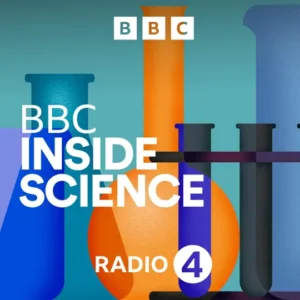
Listen Now
11. Gastropod
Gastropod explores the science and history of food. Each episode tackles a different culinary topic, from the origins of certain ingredients to the science behind cooking techniques. It’s a great listen for anyone who loves food and wants to learn more about what they’re eating. I find it fascinating how they connect food to broader scientific and historical contexts. It’s not just about recipes; it’s about understanding the world through the lens of food. For example, they might discuss abortion in the context of political polarization, which is a pretty unique angle.
Gastropod isn’t just a food podcast; it’s a journey through the science, history, and culture of what we eat. It makes you think about your next meal in a whole new way.
Here’s a quick rundown of why I think it’s worth checking out:
The hosts are engaging and knowledgeable.
The topics are diverse and always interesting.
It combines science, history, and culture in a way that’s both informative and entertaining.
It’s a solid choice if you’re looking for something that’s both educational and fun. I’ve learned a ton about food science from this podcast, and it’s made me a more thoughtful eater. Plus, it’s a great conversation starter at dinner parties!

Listen Now
12. Science Quickly
If you’re short on time but still crave your daily dose of science, Science Quickly is your go-to podcast. Hosted by Rachel Feltman and other science journalists, this podcast delivers bite-sized pieces of scientific discovery. It’s perfect for fitting into your commute or lunch break. Each episode is designed to be informative and engaging, without requiring a huge time commitment.
Science Quickly is produced by Scientific American, ensuring high-quality content and reliable information. It’s a great way to stay updated on the latest scientific advancements without getting bogged down in lengthy discussions.
Here’s what makes Science Quickly stand out:
Concise episodes: Perfect for busy schedules.
Diverse topics: Covering a wide range of scientific fields.
Expert guests: Featuring leading scientists and journalists.
It’s a fantastic way to lead better and stay informed about the world around you.
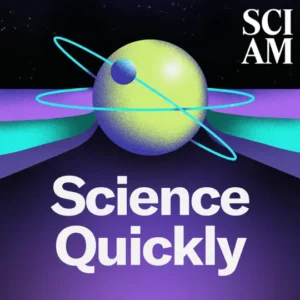
Listen Now
13. Probably Science
If you like your science with a side of comedy, Probably Science is worth checking out. Hosted by comedians Matt Kirshen, Andy Wood, and Jesse Case, this podcast tackles scientific topics with a humorous and accessible approach. It’s not afraid to get silly, but it also manages to sneak in some real science education.
They often have guests, usually other comedians or scientists, which keeps things fresh. The discussions range from the latest discoveries to weird and wacky theories. It’s a great way to learn something new without feeling like you’re back in a classroom.
I find that the hosts’ personalities really make the show. They’re genuinely curious and not afraid to ask dumb questions, which is something I appreciate. It makes the science feel less intimidating.
Here’s what you can expect:
Funny takes on current science news.
Interviews with interesting people.
A generally lighthearted approach to complex subjects.
If you’re looking for a podcast that doesn’t take itself too seriously but still delivers on the science front, give Probably Science a listen. You might be surprised at how much you enjoy learning about the world around you while laughing along the way.

Listen Now
14. Hello PhD
Okay, so Hello PhD is a podcast that I’ve been tuning into for a while now, and it’s seriously helpful, especially if you’re in, or thinking about, grad school. It’s hosted by Joshua Hall and Daniel Arneman, and they tackle all sorts of topics related to academic life, research, and career paths for people with PhDs. It’s not just dry, academic stuff, though; they keep it pretty relatable and engaging.
I remember when I first started listening back in 2015, I was feeling pretty lost about what I wanted to do after getting my doctorate. Hearing other people’s stories and the different career options they explored was a real eye-opener. It made me realize I wasn’t alone in feeling uncertain, and that there were actually a ton of possibilities out there. It’s like having mentors in your ears, guiding you through the ups and downs of academic life. The podcast also covers important topics like mental health, work-life balance, and dealing with the pressures of research, which are things that don’t always get talked about openly in academia. It’s a great resource for anyone looking for advice, support, or just a sense of community during their PhD journey.
One of the things I appreciate most about Hello PhD is that they bring in guests from all sorts of backgrounds and career stages. It’s not just professors talking to other professors; they interview people working in industry, government, and non-profit sectors, giving you a broader perspective on what you can do with a PhD. Plus, they often share practical tips on things like networking, job searching, and negotiating salaries, which are super useful when you’re trying to figure out your next move.
Here’s a quick rundown of why I think Hello PhD is worth checking out:
It offers career guidance for PhDs.
It addresses mental health and work-life balance.
It provides practical advice on job searching.
It features diverse guest perspectives.
For example, they have episodes on lab coat safety and even discuss illegal interview questions, which is something you don’t typically learn in a classroom setting. It’s this kind of real-world advice that makes Hello PhD such a valuable resource.

Listen Now
15. Scientific Sense
Scientific Sense is a podcast hosted by Gill Eapen that explores the intersection of science and economics. It’s a daily podcast that features conversations with academics, discussing their research and new ideas across various fields. The podcast thoughtfully examines topics like worker rights, the philosophy of truth, and constitutional discourse. It’s a great way to stay informed on a wide range of subjects.
Scientific Sense is an invigorating podcast that delves into the intricate tapestry of Science and Economics, serving as a nexus for intellectual exploration.
Here’s what you can expect from Scientific Sense:
In-depth discussions with leading academics.
Exploration of diverse scientific and economic themes.
Average episode length of around 67 minutes.
It has a good rating on Apple Podcasts, and you can also find it on other platforms like Spotify and YouTube.

Listen Now
16. Science In Action
Science In Action, brought to you by the BBC, delivers the week’s top science news. I find it pretty cool that they cover such a wide range of topics. It’s not just dry research papers; they really try to make it accessible.
The podcast is hosted by Roland Pease, and it seems like he always has a good handle on the material. It’s a great way to stay informed about what’s happening in the world of science without having to read a ton of articles.
Here’s what you can expect:
Weekly updates on scientific breakthroughs.
Interviews with leading scientists.
Coverage of global issues with a science angle.
It’s a solid choice for anyone wanting to keep up with current science news. You can usually find the latest science news on their website or through podcast apps.

Listen Now
17. CrowdScience
Ever wondered how scientists tackle real-world problems using public input? That’s the core of CrowdScience. This podcast, produced by the BBC World Service, answers questions sent in by listeners from around the globe. It’s a fascinating look at how citizen science works and the surprising discoveries that can come from it.
Each episode tackles a different question, sending researchers on a quest for answers. The show highlights the collaborative nature of science, demonstrating how anyone can contribute to important research. It’s not just about lab coats and complex equations; it’s about curiosity and the power of collective intelligence.
CrowdScience is great because it makes science accessible and engaging. It shows that science isn’t just for experts; it’s for everyone who’s curious about the world around them.
Here’s a quick rundown of why you should give it a listen:
Real questions from real people.
Global perspective on scientific issues.
Highlights the importance of public participation in science.
If you’re looking for a podcast that’s both informative and inspiring, CrowdScience is definitely worth checking out. It’s a great way to learn about different scientific fields and see how research impacts our daily lives. You might even be inspired to submit your own question! Check out other culture podcasts for more listening options.
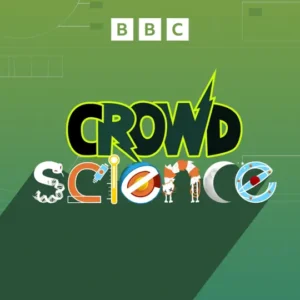
Listen Now
Conclusion
So, there you have it. We’ve gone through a bunch of great science podcasts that are out there. It’s pretty clear that no matter what part of science you’re into, there’s a podcast for you. These shows are a good way to keep up with new ideas and learn new things. They make complex topics easier to understand, which is always a plus. Hopefully, this list helps you find some new favorites to listen to in the coming year. Happy listening!
Frequently Asked Questions
What exactly are science podcasts?
Science podcasts are audio shows that talk about different science topics. They can cover anything from space and animals to how our brains work. They’re a fun way to learn new things and keep up with discoveries.
Why should I listen to science podcasts?
Listening to science podcasts helps you learn a lot without even trying too hard. You can hear about new ideas, understand tough science stuff in simple ways, and get excited about how the world works. It’s like having a science teacher in your pocket!
Where can I find these science podcasts?
You can find science podcasts on many apps and websites. Popular places include Spotify, Apple Podcasts, Google Podcasts, and Stitcher. Just search for the podcast name or ‘science podcasts’ to find them.
Are these podcasts only for science experts?
Many science podcasts are made for everyone, even if you’re not a science expert. They often explain things clearly and use stories to make topics interesting. Look for ones that say they are for a general audience or beginners.
Do I have to pay to listen to these podcasts?
Yes, many science podcasts are totally free to listen to. You just need an internet connection to download or stream them. Some might have special bonus content you can pay for, but the main episodes are usually free.
How do I pick the best science podcast for me?
The best science podcast for you depends on what you like! If you enjoy deep dives into strange topics, try “Radiolab” or “Ologies.” For daily science news, check out “Science Quickly.” If you like humor with your science, “StarTalk” is a great choice.
How often do new episodes come out for these podcasts?
Most podcasts release new episodes regularly, like once a week or every two weeks. Some might release them less often, like once a month. You can usually find their schedule on their website or in your podcast app.
Can I listen to these podcasts while doing other things?
Absolutely! Podcasts are perfect for listening while you’re doing other things, like walking, driving, or even cleaning. It’s a great way to make the most of your time and learn something new.

